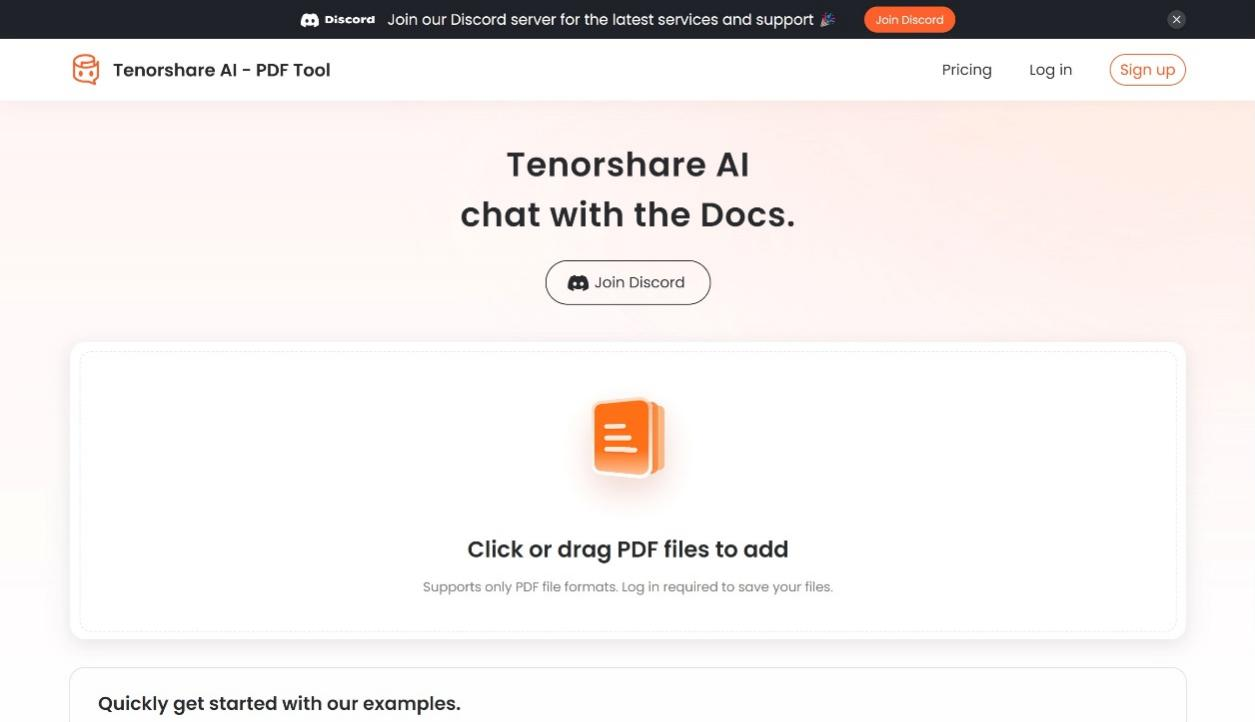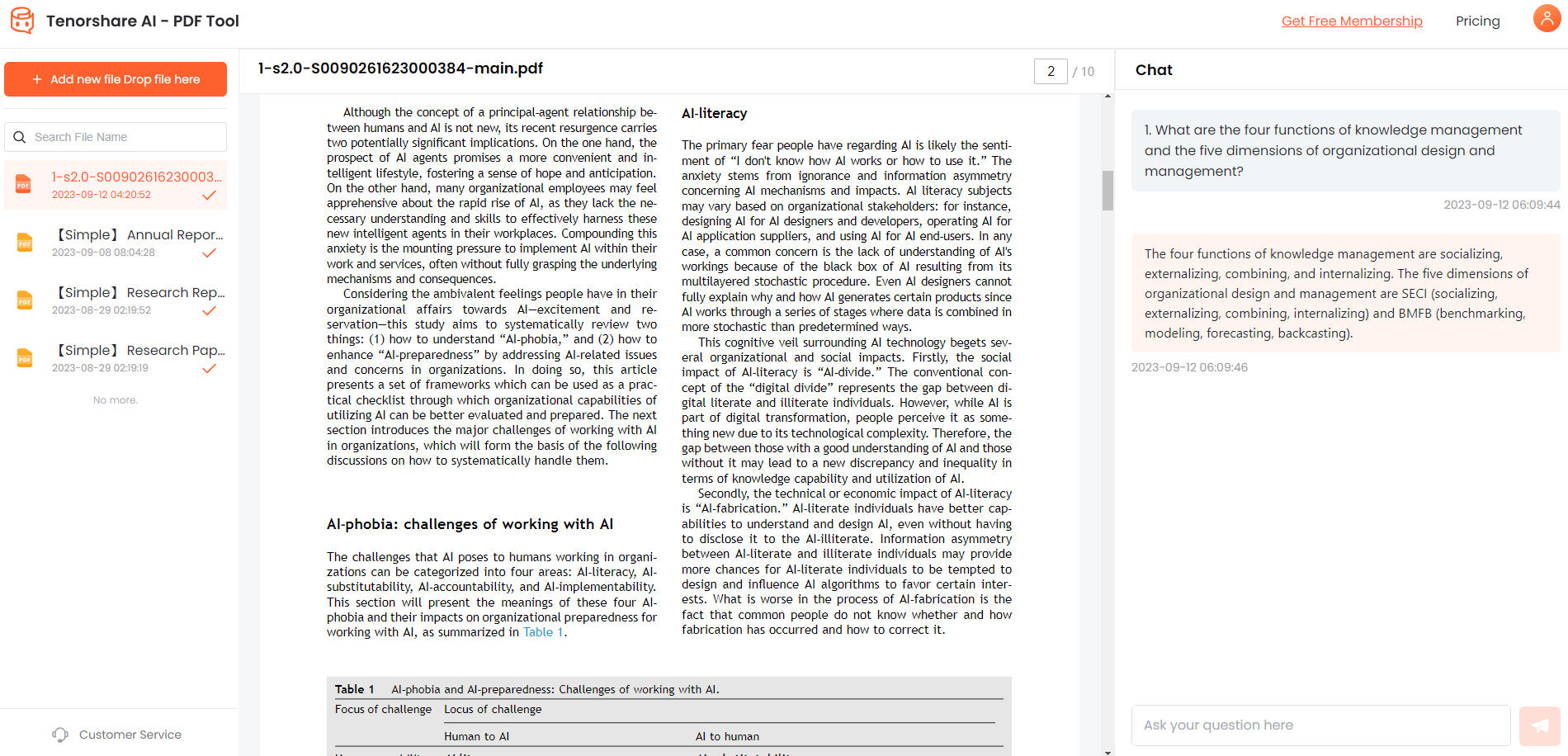Exploring the Pros and Cons of AI in Education: Benefits, Challenges, and the Future of Learning
Artificial intelligence (AI) has greatly changed many fields, but education is no exception. As AI continues to evolve, its integration into the educational field underlies the educational world, providing both exciting opportunities and major challenges. If you're interested in integrating AI in your academic journey, Tenroshare AI ChatPDF can be a game-changer. This article explores the greatest benefits and disadvantages of AI in education from all different perspectives of its application.
Catalogs:
Part 1: What is artificial intelligence in education?
AI in education means using machine learning algorithms, natural language processing and other AI technologies to improve learning experiences, improve management efficiency, and provides data-based insights. For a deeper dive, check out our articles on the Best Free AI Chatbots and the 9 Best Free AI Tools Online to explore the top tools that are transforming the educational landscape. Here is an example of how AI can be applied to education:
- Adaptive Learning Platform: A system utilizing AI that adjusts education content according to each student's needs and adjusts difficulty and learning pace according to grades and progress.
- Automatic grading system: AI tool for grading assignments, tests, and small tests to provide students with immediate feedback and reduce teacher grading burden.
- Virtual Teaching Assistant: AI-driven chatbots and virtual assistants that can answer student inquiries, provide personal instruction, and support management.
- Speech Recognition and Natural Language Processing: A technology that enables speech-to-text conversion and text-to-speech conversion to support students with disabilities and language learning.
- Intellectual Personal Instruction System: An AI program that provides one-on-one individual instruction to suit students' learning needs and styles.
- Behavioral Analysis: An AI system that monitors students' behavior and learning efforts in real time to help educators identify problems and deal with them quickly.
Part 2: Five Pros of Artificial Intelligence in Education
Personalized Learning
One of the greatest advantages of artificial intelligence in education is the ability to provide a personalized learning experience through data-driven insights. AI algorithms can analyze individual student data, such as learning pace, pros and cons, and coordinate educational content and activities. This allows each student to receive a customized learning experience that maximizes their potential.
Automate management operations
Because AI can automate day-to-day management, educators can spend valuable time teaching and teaching. Tasks such as assignment grading, attendance, and schedule management can be handled efficiently by AI systems.
Open every day of the year
AI allows students to receive support whenever and wherever they need it. The AI system is available 24/7 to provide individual homework instruction, explanation of difficult concepts, and answer questions. This round-the-clock support ensures that students are able to learn at their own pace, freeing up limited time for teachers.
Real-time feedback
The AI system provides real-time feedback on students' grades, enabling immediate modification and enhancement of concepts. This continuous assessment allows students to understand their mistakes and learn quickly from them, improving overall grades and information retention.
Integration of AI into educational curriculum
Incorporating AI Educational Tools curriculum provides two opportunities: enabling both AI education and AI education. Students can acquire essential skills to navigate and understand AI technology and prepare for future careers in the rapidly evolving job market. In addition, by incorporating AI tools into the learning process, educational experience will be enhanced and more interactive and efficient.
Part 3: Five Cons of artificial intelligence in education
Risk of errors and biases
AI systems are prone to errors and biases, often due to data used for learning. If learning data contains bias, AI can perpetuate these biases and lead to unfair or inaccurate results. Regular audits and updates are essential to minimize these risks and ensure fairness and accuracy.
Reliance on Technology
Excessive reliance on AI can be harmful. Technical failures and malfunctions disrupt the learning process, and excessive reliance on technology can lead to critical thinking and poor problem solving skills. It is essential to balance using AI as a tool and maintaining traditional teaching methods.
Privacy Concerns
The use of AI in educational settings raises major privacy concerns. AI systems often require access to large amounts of personal data, including students' grades and actions. Ensuring the security of this data and protecting it from breaches is critical. Exploitation and breach of data can have serious consequences for students and institutions.
Lack of human interaction
AI in education may reduce the amount of human interaction essential to social and emotional development. Teacher-student relationships play an important role in learning, motivating, supporting and providing guidance. Overly dependent on AI can reduce such interactions and affect the overall educational experience.
Risk of Cheating
The most discussed disadvantage of artificial education in the field of education is the new opportunity for cheating brought by artificial education. It is a real problem for students to use AI tools to create works that they think are original.
Comparing the Key Aspects of AI in Education
Here's an interesting info table comparing the key aspects of AI in education with traditional methods, highlighting the advantages of AI and concluding with the winner:
| Aspect | AI in Education | Traditional Methods | Winner |
|---|---|---|---|
| Personalization | AI provides tailored learning experiences based on student data and progress. | Personalization is limited by the teacher’s ability to adapt content. | AI |
| Efficiency | Automates grading, scheduling, and administrative tasks, saving valuable time for educators. | Teachers handle all tasks manually, leading to time constraints. | AI |
| 24/7 Availability | AI systems are available around the clock for student support and learning. | Limited to school hours and teacher availability. | AI |
| Feedback Speed | Instant feedback for students, enabling quick corrections and improvements. | Feedback can take time due to teacher workload. | AI |
| Adaptability | AI systems adapt learning materials to the student's needs and pace. | Content is fixed and cannot easily adapt to individual learning speeds. | AI |
| Scalability | AI can handle large numbers of students, ensuring scalability. | Limited by teacher-student ratios and classroom size. | AI |
| Human Interaction | AI may reduce face-to-face interactions, which can impact emotional development. | Strong teacher-student interaction, fostering emotional and social growth. | Traditional |
Verdict: While traditional methods offer valuable human interaction, AI in education delivers personalized, efficient, and scalable learning experiences that significantly enhance the educational journey. AI’s ability to provide 24/7 support, instant feedback, and data-driven insights makes it a game-changer in the future of education.
Part 4: The Future of Artificial Intelligence in Education
As the use of artificial intelligence in education grows, ensuring ethical and proper use of AI-generated content becomes crucial. These tools are especially useful for educators seeking to maintain originality in student submissions and uphold ethical practices in AI-enhanced educational environments. Tenroshare AI Detector stands out as a reliable solution for identifying AI-generated content in various academic and educational contexts
Key Features of Tenroshare AI Detector:
- Accurate AI Detection: Identifies AI-generated text with advanced algorithms to ensure authenticity in assignments and content.
- User-Friendly Interface: Simplified design allows easy navigation, making it accessible for educators and students alike.
- Real-Time Analysis: Provides instant results, enabling quick verification of content sources.
- Cross-Platform Compatibility: Works seamlessly across multiple devices, including desktops, tablets, and smartphones.
- Multi-Language Support: Detects AI-generated content in several languages, catering to diverse educational needs.
Part 5: Effortless PDF Management for Students and Educators with Tenroshare AI ChatPDF
Tenroshare AI ChatPDF is a powerful tool designed to streamline working with PDFs, making it an essential asset for students and educators. Whether you're a student digging into research or a teacher crafting lesson plans, this AI-driven solution simplifies content extraction and improves efficiency. With features like instant PDF analysis, AI-powered summaries, and intuitive search, it helps save time while enhancing productivity. Plus, its user-friendly interface and support for multiple document formats ensure seamless navigation for all users.
Top Features of Tenroshare AI ChatPDF:
- Instant PDF Analysis: Extract key insights from lengthy PDFs in seconds, saving time on research and review.
- AI-Powered Summaries: Automatically generate concise summaries, perfect for quick reference.
- Intelligent Search: Find specific information using natural language queries, making data extraction efficient.
- User-Friendly Interface: Simple design ensures anyone can easily navigate and use the tool.
- Multiple Formats Supported: Works with research papers, textbooks, and other educational resources in PDF form.
Simple Steps to use Tenorshare AI ChatPDF
Visit the Tenorshare AI ChatPDF Website: Go to Tenorshare AI ChatPDF to access the platform.
Upload Your PDF Document: Simply upload the PDF file you want to summarize, whether it's a textbook, research paper, or lesson plan.

Use the Chatbox for Summarization: Once your PDF is uploaded, use the chatbox to command the AI, such as “summarize this PDF into a one-paragraph overview.” The AI will process the document and provide a concise summary to save you time and enhance your productivity in education.

Conclusion
Artificial Intelligence is undoubtedly reshaping the educational landscape by offering personalized learning experiences, optimizing administrative efficiency, and expanding access to resources. However, it also brings challenges, such as high costs, data privacy concerns, and the risk of over-dependence on technology. If you"re ready to explore how AI can transform your educational journey, try out Tenroshare AI ChatPDF today. Embrace the future of educational journey, try out Tenroshare AI ChatPDF today. Embrace the future of education with the right tools and a balanced approach!
You Might Also Like
- Full Guide to Export Chat to PDF: Teams, WhatsApp, Instagram, Facebook, WeChat, Google Chat
- How to Use ChatGPT to Upload, Read, and Summarize PDF Files: Complete Guide
- A Quick Guide to Converting VCE Files to PDF
- UPDF Review: A Powerful AI-Enhanced PDF Editor for Efficient Document Management
- PDF Drive Full Review: Is It Safe and Legal to Use?
- 12 Best Free PDF Drive Alternatives for Better Online Reading and Downloads



